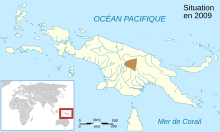Copiula rivularis
| Copiula rivularis | |
|---|---|
| Scientific classification | |
| Domain: | Eukaryota |
| Kingdom: | Animalia |
| Phylum: | Chordata |
| Class: | Amphibia |
| Order: | Anura |
| Family: | Microhylidae |
| Genus: | Copiula |
| Species: | C. rivularis |
| Binomial name | |
| Copiula rivularis (Zweifel, 2000) | |

| |
| Synonyms | |
|
Austrochaperina rivularis Zweifel, 2000[2] | |
Copiula rivularis is a species of frog in the family Microhylidae. It is endemic to Papua New Guinea and known from near the Indonesian border east to the Morobe Province;[3] it is expected to occur in the Papua province of Indonesia.[1] The specific name comes from the Latin adjective pertaining to small brooks or streams and refers to the habitat of this species.[2] Based on molecular evidence, it was transferred from Austrochaperina to Copiula in 2016.[3][4]
Description
Males grow to 45 mm (1.8 in) and females to 52 mm (2.0 in) in snout–vent length; the body size is geographically variable. The dorsum is olive-brown with darker brown markings. Ventral coloration is gray-brown with faint darker mottling that is most evident on the chin. The legs are moderately long. The tympanum is scarcely visible. The fingers and toes are unwebbed and have well-developed terminal discs.[2]
Habitat and conservation
Its natural habitats are tropical forests where it occurs along small streams;[1] they might hide under the leaf litter but are good swimmers.[2] It is locally abundant and there are no known threats facing it.[1]
References
- ^ a b c d Richards, S. & Zweifel, R. (2004). "Austrochaperina rivularis". IUCN Red List of Threatened Species. 2004: e.T57700A11671759. doi:10.2305/IUCN.UK.2004.RLTS.T57700A11671759.en.
- ^ a b c d Zweifel, R. G. (2000). "Partition of the Australopapuan microhylid frog genus Sphenophryne with descriptions of new species". Bulletin of the American Museum of Natural History. 253: 1–130. doi:10.1206/0003-0090(2000)253<0001:POTAMF>2.0.CO;2. hdl:2246/1600. S2CID 85621508.
- ^ a b Frost, Darrel R. (2016). "Copiula rivularis (Zweifel, 2000)". Amphibian Species of the World: an Online Reference. Version 6.0. American Museum of Natural History. Retrieved 27 July 2016.
- ^ Peloso, Pedro L.V.; Frost, Darrel R.; Richards, Stephen J.; Rodrigues, Miguel T.; Donnellan, Stephen; Matsui, Masafumi; Raxworthy, Cristopher J.; Biju, S.D.; Lemmon, Emily Moriarty; Lemmon, Alan R.; Wheeler, Ward C. (2016). "The impact of anchored phylogenomics and taxon sampling on phylogenetic inference in narrow-mouthed frogs (Anura, Microhylidae)". Cladistics. 32 (2): 113–140. doi:10.1111/cla.12118. PMID 34732021. S2CID 84925667.

